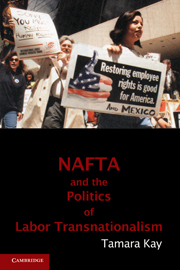Book contents
8 - Global Governance and Labor Transnationalism
Published online by Cambridge University Press: 05 June 2012
Summary
Between 1985 and 2001, the terrain on which labor unions in North America struggled changed significantly. Prior to 1990, unions across the continent generally waged independent and isolated battles against transnational corporations and unresponsive or hostile national governments. Rarely did they cooperate across national borders. In the exceptional instances in which unions did attempt to collaborate transnationally, their exchanges were usually not driven by mutual interests and had few long-term results. Moreover, they were generally reactive rather than proactive, amounting to little more than obligatory though empty gestures of support and solidarity. In the pre-NAFTA era, not one national industrial union in North America participated in a transnational relationship based on long-term strategic action and mutual interest. The solidification of processes of regional economic integration in the form of a North American free trade agreement, however, sent a shock across the continent that forced unions to respond in new and creative ways.
Unions in North America responded to NAFTA's threat by forming broad coalitions to defeat its passage. NAFTA helped union leaders recognize that processes of regional economic integration inextricably entwined the economic fates of North American workers. To combat the forces of multinational corporations and neoliberal governments alone would be futile. Only through cooperation would it be possible to counter the neoliberal economic project in North America. But cooperation required slaying the “foreign worker” myth and the notion that only workers north of the Rio Grande were entitled to the benefits and protections of decent jobs.
- Type
- Chapter
- Information
- NAFTA and the Politics of Labor Transnationalism , pp. 255 - 278Publisher: Cambridge University PressPrint publication year: 2011



